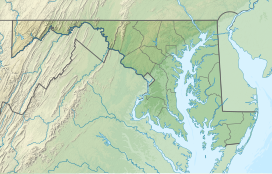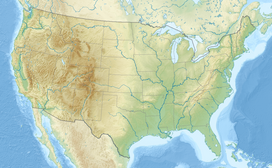Casselman Bridge
| Casselman River Bridge State Park | |
|---|---|
 The bridge's south aspect | |
| Location | Garrett County, Maryland, United States |
| Nearest town | Grantsville, Maryland |
| Coordinates | 39°41′48″N 79°08′37″W / 39.69667°N 79.14361°W |
| Area | 4 acres (1.6 ha)[1] |
| Elevation | 2,113 ft (644 m) |
| Established | 1957 |
| Administered by | Maryland Department of Natural Resources |
| Status | Closed pending bridge repairs scheduled for 2024[2] |
| Designation | Maryland state park |
| Website | Official website |
Casselman's Bridge, National Road | |
 | |
| Location | East of Grantsville on U.S. Route 40 Alternate, Grantsville, Maryland |
| Area | < 1 acre |
| Built | 1813–1814 |
| Architect | David Shriver Jr.[3] |
| NRHP reference No. | 66000391 |
| Significant dates | |
| Added to NRHP | October 15, 1966 |
| Designated NHL | January 29, 1964 |
The Casselman Bridge is a historic transportation structure on the Casselman River, located immediately east of Grantsville in Garrett County, Maryland, and preserved by the state of Maryland as Casselman River Bridge State Park.[2][4] The bridge was built in 1813–1814 as part of the National Road. Historic markers posted at each end read:
Erected 1813 by David Shriver Jr.,
Sup't of the "Cumberland Road" (The
National Road). This 80 foot span
was the largest stone arch in America
at the time. It was continuously
used from 1813 to 1933.[5]
The structure, which has also been known as Casselmans Bridge, Castleman's Bridge, and Little Crossings Bridge, was declared a National Historic Landmark in 1964[6] and placed on the National Historic Register in 1966.[7]
History
[edit]The 354-foot-long (108 m) stone arch bridge spans 80 feet (24 m) with a 30-foot-high (9.1 m) arch and a roadway width of 48 feet (15 m).[8][9] The bridge was constructed in 1813–1814 to aid in the westward movement through the frontier wilderness west of Cumberland, Maryland. The first wheeled vehicles crossed the bridge in 1815.[10] As a "tidal wave" of western expansion followed the opening of the National Road, Casselman Bridge had heavy traffic that included 10-ton loads drawn by 12-horse teams.[7] A small portion of the original National Road still exists at the approaches to the bridge.[8]
The bridge was strengthened for motorized traffic in 1911 and continued in service as a highway until 1933, when a modern steel span was built nearby to serve what is now US Route 40 Alternate.[10] In the 1940s and early 1950s, efforts were made to preserve the bridge when sections started to crumble. The bridge was closed to vehicles in 1953,[11] partially restored by the state in the mid-1950s,[9] and became a state park in 1957.[3] Additional maintenance occurred in 1979, 1996, 2002, and 2012.[12]
Activities and amenities
[edit]In addition to walking over the historic bridge, the state park offers picnicking facilities and fishing in Casselman River. Historic structures to the east of the park include Stanton's Mill, which is listed on the National Register of Historic Places,[2] and the restored log cabin craft shops of Spruce Forest Artisan Village.
See also
[edit]- Buckel's Bog
- Maryland bridges documented on the Historic American Engineering Record
- Maryland bridges on the National Register of Historic Places
- List of National Historic Landmarks in Maryland
- National Register of Historic Places listings in Garrett County, Maryland
References
[edit]- ^ "DNR Lands Acreage Report" (PDF). Maryland Department of Natural Resources. Retrieved October 8, 2024.
- ^ a b c "Casselman River Bridge State Park". Maryland Department of Natural Resources. Retrieved October 8, 2024.
- ^ a b Zumbrun, Francis Champ. "Casselman River Bridge Bicentennial". Maryland Department of Natural Resources. Retrieved January 3, 2020.
- ^ "DNR restricts access to the bridge and the immediate area" (Press release). Maryland Department of Natural Resources. March 6, 2012. Archived from the original on January 4, 2013. Retrieved July 30, 2015.
- ^ "Castleman's River Bridge". Historical Marker Database. Retrieved January 10, 2014.
- ^ "Listing of National Historic Landmarks by State". National Park Service. Retrieved January 3, 2020.
- ^ a b Joseph Scott Mendinghall, Historian (May 3, 1976). "Casselman Bridge, National Road". National Register of Historic Places Inventory Nomination. National Park Service. Retrieved May 27, 2016.
- ^ a b "Casselman Bridge, National Road". National Register Listings in Maryland. Maryland Historic Trust. Retrieved January 10, 2014.
- ^ a b "History". Casselman River Bridge State Park. Maryland Department of Natural Resources. Retrieved January 3, 2020.
- ^ a b "Little Crossings Bridge, National Road". Library of Congress. Retrieved July 30, 2015.
- ^ "Repairs scheduled for Casselman River Bridge". Maryland Department of Natural Resources. September 28, 2012. Archived from the original on July 4, 2013. Retrieved July 30, 2015.
- ^ Sawyers, Michael A. (June 25, 2012). "No stone left unturned on Casselman Bridge". Cumberland Times-News. Cumberland, MD. Retrieved July 30, 2015.
External links
[edit]- Casselman River Bridge State Park Maryland Department of Natural Resources
- Inventory No. G-II-C-014: Casselman Bridge, National Road (various documents) Maryland State Archives
- Historic American Buildings Survey (HABS) No. MD-139, "Casselman River Bridge", 3 photos
- Historic American Engineering Record (HAER) No. MD-128, "Little Crossings Bridge", 2 measured drawings
- Casselman Bridge, Garrett County, including photo from 1996, at Maryland Historical Trust
- Parks in Garrett County, Maryland
- State parks of the Appalachians
- National Historic Landmarks in Maryland
- Road bridges on the National Register of Historic Places in Maryland
- Bridges completed in 1813
- State parks of Maryland
- Transportation buildings and structures in Garrett County, Maryland
- Pedestrian bridges in Maryland
- Former road bridges in the United States
- Historic American Buildings Survey in Maryland
- Historic American Engineering Record in Maryland
- National Road
- National Register of Historic Places in Garrett County, Maryland
- Stone arch bridges in the United States
- Protected areas established in 1957
- 1957 establishments in Maryland



